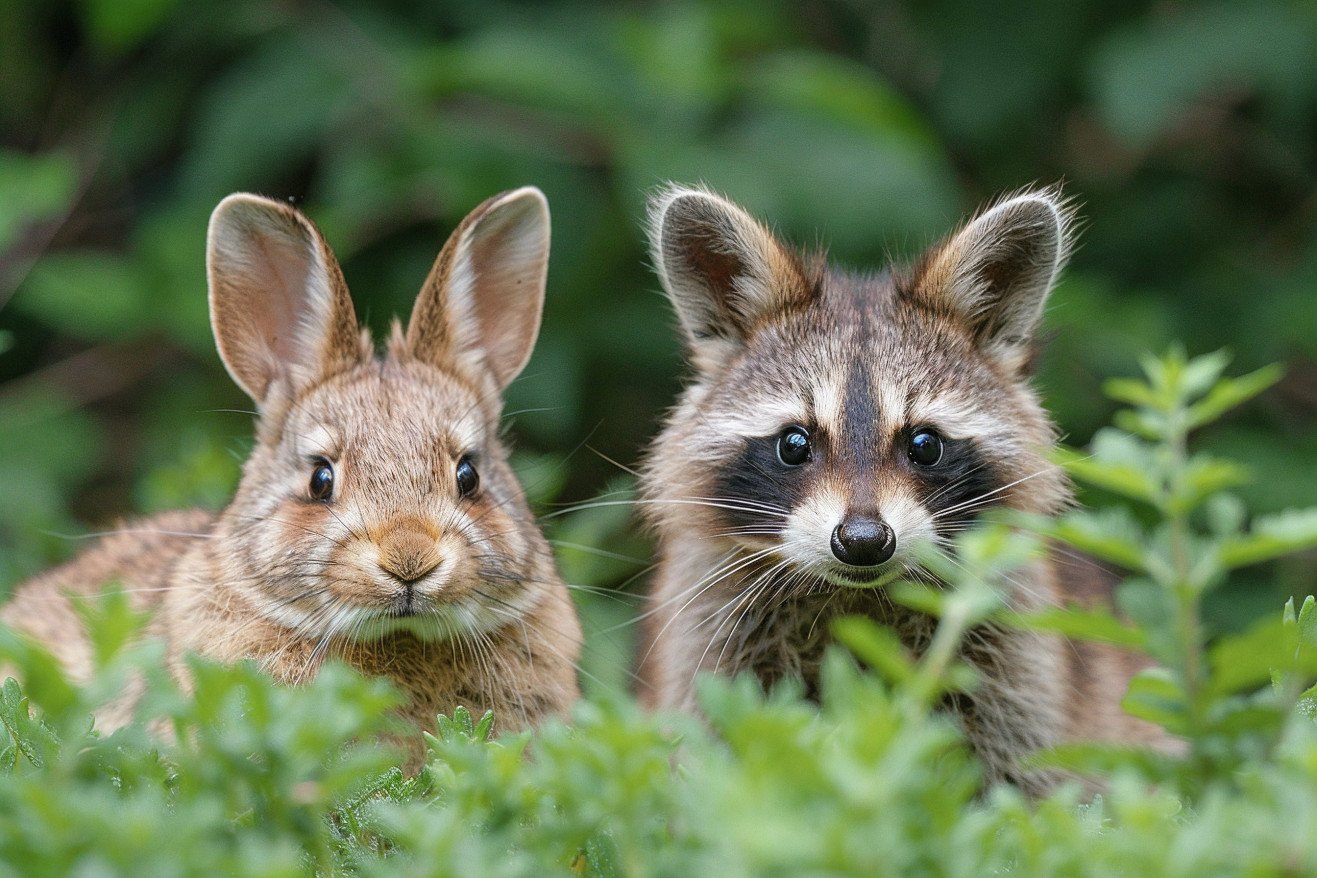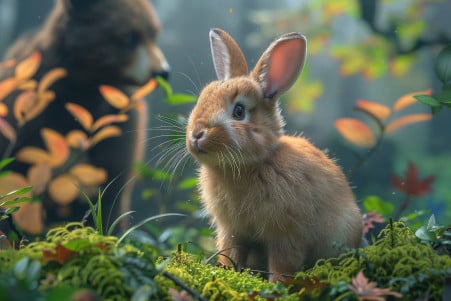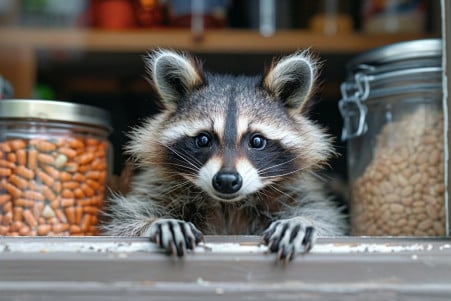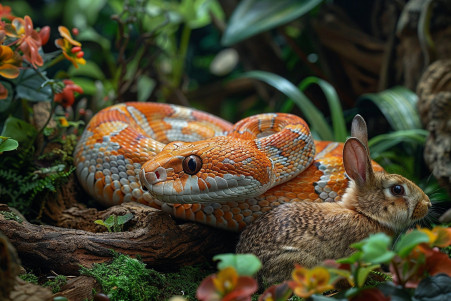Do Raccoons Eat Rabbits? An Exploration into Their Predatory Behavior
15 May 2024 • Updated 15 May 2024

Raccoons are well-known for their curious behavior and nimble hands, and they are also known to prey on a wide range of animals, but does that include rabbits? It does! Raccoons are opportunistic omnivores and will eat rabbits if they can catch them. However, while rabbits are on the menu, raccoons primarily eat plants. That said, they are also known to hunt and eat small mammals, including rabbits, especially when other food sources are limited. Their nimble hands make it easy for them to catch and eat rabbits and other prey that they can get their paws on.
Because they are omnivores, which means they will eat almost anything, raccoons have a wide range of diets that can be influenced by a number of factors, including their environment and the availability of food. This article will look at studies conducted by wildlife biologists and behavioral ecologists to explain raccoons' predatory behavior toward rabbits and other small mammals. This will help us better understand the flexible foraging behaviors and ecological roles of these intelligent urban animals.
Do raccoons eat rabbits?
What Do Raccoons Eat? Opportunistic Omnivores
Raccoons are opportunistic omnivores and have a diverse diet that includes a wide range of plant and animal foods. Although they primarily eat fruits, nuts, berries, insects, and other invertebrates, they also consume small mammals such as rabbits, mice, and muskrats when the opportunity arises. The raccoon's diet is largely determined by the availability of food and the environment in which they live.
For example, raccoons that live in urban areas are more likely to eat from garbage cans and pet food dishes than their rural counterparts, who are more likely to eat a diet that includes fruits, nuts, seeds, frogs, crayfish, snakes, and small rodents. Although rabbits aren't a raccoon's primary food source, they will eat them and other small mammals when they're readily available and other food sources are limited.
Things That Impact Raccoon Rabbit Predation
There are a number of things that can impact the likelihood of raccoons preying on rabbits. This includes habitat factors, food availability, competition, and seasonality. For example, a study by the Newtown Bee found that in urban areas with lots of food, raccoons are more likely to eat things like garbage than expend energy hunting rabbits.
On the other hand, research from Beasts Loco found that in times of scarcity or seasonal changes, raccoons are more likely to expand their diet and hunt rabbits. Meanwhile, the size and vulnerability of the rabbit and the availability of other prey can also impact whether or not a raccoon will hunt rabbits. For example, the Your Ultimate Wildlife Guide explains that raccoons are more likely to hunt rabbits if they are young, weak, or sick.
These are just a few examples of the many factors that can impact raccoon predation on rabbits. However, they help illustrate the complex relationship between these two species and how their interactions can change depending on a number of different factors.
How Raccoons Hunt Rabbits
Raccoons are natural hunters with highly developed senses of touch, hearing, and sight that help them find and catch their prey. The Washington Department of Fish & Wildlife explains that raccoons use their nimble front paws to catch and control smaller animals like rabbits. Raccoons are also primarily nocturnal, so most of their hunting and foraging happens at night.
Raccoons are less nimble than rabbits, but they can still climb and dig to get into rabbit enclosures or burrows. Pet Keen says that raccoons are likely to use ambush or stealth hunting techniques to catch rabbits, since they prefer to avoid direct conflict. This enables them to outmaneuver rabbits, which are fast and agile and can put up a good fight.
Raccoons' hunting habits and skills give us some clues about how they might adapt their foraging to hunt rabbits and the complicated relationships they have with rabbit populations in their shared environment.
Coexistence and Competition: Raccoons and Rabbits
Raccoons and rabbits are two species that often coexist in the same environments, but their relationship is more complicated and depends on a number of factors. A study by the DFW Urban Wildlife notes that competition for resources, such as food and shelter, is a major source of conflict between the two species. Raccoons, which are highly adaptable, may be especially threatening to rabbit populations, especially in areas where rabbits are already at-risk or endangered.
A study published in ScienceDirect also showed that raccoon activity was a limiting factor for the Lower Keys marsh rabbit, as rabbit pellet counts were lower in patches with higher raccoon activity. In general, habitat fragmentation and human activities that disrupt the natural order may tip the scales in favor of raccoons over rabbits.
By working to manage raccoon populations and ensure that rabbits have enough cover, coexistence between the two species can be supported. This may involve habitat management and population control to ensure that the ecosystem remains in balance.
How Do Rabbits Protect Themselves?
Rabbits have a number of instinctual behaviors and defense mechanisms that help them avoid predation from raccoons and other predators. Per Pets on Mom.com, these include the freeze response to stay hidden, the flight response to run away from danger, and the fight response when there are no other options.
Mother rabbits are also known to be extremely protective of their young, as shown in a video by National Geographic in which a mother rabbit attacked a snake that had come near her nest. These mothers will chase away any potential threats to their babies.
It is important for rabbit habitat to have dense cover, like shrub thickets and brush piles, to help rabbits escape from predators. Knowing these protective behaviors of rabbits can help with the development of successful conservation and management plans that will help rabbits and their predators live together.
Conclusion: Managing the Predator-Prey Relationship
Raccoons and rabbits share many of the same habitats, yet their relationship is complicated and depends on a number of different factors. DFW Urban Wildlife notes that competition for resources, especially food and shelter, can lead to conflicts between the two species. Raccoons, which are highly adaptable, may be especially threatening to rabbit populations, especially in areas where rabbits are already at risk or endangered.
A study published in ScienceDirect showed that raccoon activity was a limiting factor for the Lower Keys marsh rabbit, as rabbit pellet counts were lower in patches with higher raccoon activity. Habitat fragmentation and human activities that disrupt the natural balance can potentially tip the scales in favor of raccoons over rabbits.
By working to manage raccoon populations and ensure that rabbits have enough cover, the two species can continue to coexist. This may involve habitat management and population control to ensure that the ecosystem remains in balance.


